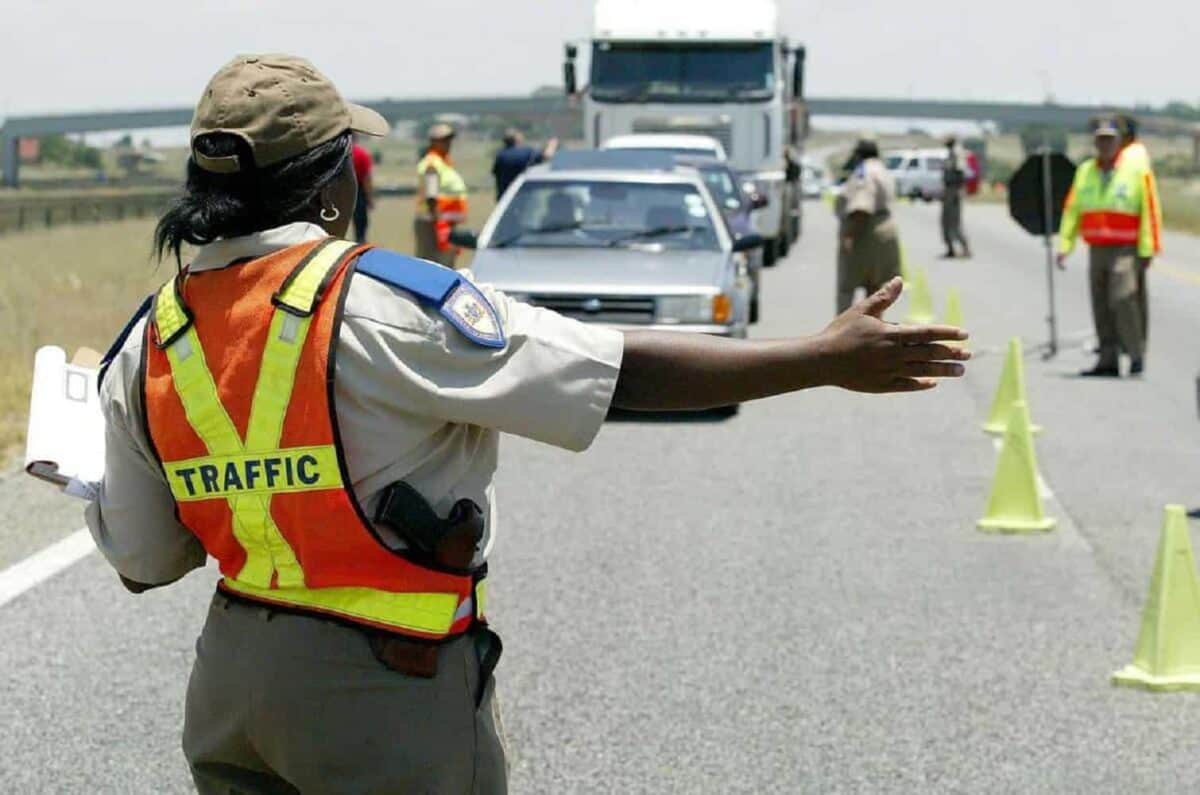
With just over a month to go before the phased roll-out of the Administrative Adjudication of Road Traffic Offences (Aarto) Act, experts and insiders are warning of administrative chaos and a surge in roadside bribery.
Industry insiders say motorists are in for a rude awakening, with rogue traffic officials expected to laugh all the way to the bank as drivers facing licence suspensions choose to pay bribes rather than risk losing their right to drive.
Several traffic officers, who spoke on condition of anonymity, admitted they expect an increase in bribe offers from desperate motorists.
“Even those who have never paid a bribe before will start doing so because no one wants to lose their licence,” an officer said.
“Before, people would just pay the fine. But with the demerit system, whether you pay or not you still lose points. Eventually, you lose your licence so people will take shortcuts.”
Aarto’s demerit system could worsen bribes – traffic officers
Another officer agreed, saying many motorists rely on their driving licences to earn a living and would not risk suspension or cancellation.
The officer said they were paid peanuts and many survive by taking bribes and that the demerit point scheme will not reduce accidents, but will feed corruption.
“Also, our roads are full of cloned cars and fake licences issued to people who cannot even read road signs.
“Therefore, our road safety interventions have not been dealing with the root causes but with symptoms,” the officer said.
In September last year, at least 11 traffic officers were arrested in Polokwane for allegedly accepting bribes from drivers, taxi drivers and bus operators on the N1 highway between Polokwane and Musina.
ALSO READ: Aarto implementation date of 1 December ‘still tentative’
Motorists could also soon find themselves unable to renew vehicle licences as the Road Traffic Infringement Agency (RTIA), the body implementing Aarto, begins enforcing long-ignored provisions of the Act.
According to Fines4U, a company managing traffic fines for clients, the RTIA quietly began complying with its own regulations in December 2024, issuing proper courtesy and enforcement notices for the first time in years, a move that could catch many off guard.
Fines4U owner Cornelia van Niekerk said her company had taken the RTIA to court in 2012, 2015 and 2017, winning each time, with those rulings allowing the cancellation of most fines issued before December 2024.
“They have fixed all their issues. They are sending courtesy letters and enforcements according to their own rules.
“People are going to be very surprised when they want to renew their licences. They will be blocked on NaTIS.
RTIA quietly began complying with regulations in December 2024
“With the new rules of Aarto, companies cannot pay drivers’ fines and deduct from their salaries. All fines must be nominated to the driver.
“This is to allocate the demerit points. If they do not nominate, they will lose their own points. When that happens, no transactions on NaTIS can be done,” she said.
Van Niekerk added that Fines4U could assist companies to nominate a driver directly on NaTIS and that no paperwork was needed and that only the motorist’s identity number and driving licence number were needed for this.
The Aarto system, first introduced as a pilot in Tshwane in 2008 and later in Johannesburg in 2009, will go live in 69 municipalities, including Johannesburg, Cape Town and Durban, from 1 December, with a national rollout expected in April next year.
The demerit points system will follow in September.
ALSO READ: Driving licence points demerit system still ‘a long way off’
In April 2023, the Organisation Undoing Tax Abuse (Outa) lost its Constitutional Court challenge to the scheme.
The court upheld Aarto’s constitutionality, overturning a High Court in Pretoria ruling that found the law invalid.
Outa had argued that the legislation unlawfully intruded on provincial and municipal powers to regulate road traffic.
Despite the loss, Outa maintains that Aarto will not solve South Africa’s road safety crisis.
CEO Wayne Duvenage warned that the system requires impeccable efficiency which, he said, South Africa’s traffic administration lacks.
System requires impeccable efficiency
“We do not oppose the licence demerit point system. It works in a number of countries.
“However, in those countries, they have extremely robust administrative systems and good enforcement and visible policing.
“Driving without a driver’s licence, or without the vehicle being licensed, or on false or cloned plates, or in an unroadworthy car, is likely to get you caught and in trouble with the authorities there. This is not the case here in SA,” he added.
Duvenage said schemes as complex as Aarto required extremely efficient processes and all checks and balances to be in place before they are launched.
He said the Aarto required the NaTIS system to be accurate, or have a very high level of accuracy, which he said was not the case, especially when it comes to vehicle owner contact details and cloned numberplates.
ALSO READ: RTIA says Aarto Act implementation will increase municipalities’ income
As was the case with the abandoned e-toll scheme, Duvenage said it would collapse on the burden of its own administrative weight.
He charged that government was repeating the same mistake in Aarto as it did with e-tolls, in that government believed that putting in place laws and regulations would make the scheme work.
Duvenage said they were also concerned that people will have access to the system to see if they have pending fines, where and when these were issued and the ease with which they can query and raise objections to these fines.
“The size, location, accessibility and ability of the tribunal to tackle the vast amount of queries appears to be a serious concern.
“We are also concerned at the number of fines that have to date been issued unlawfully – that is there is no trace of issuing and servicing of these fines being done within the required timeframes, which means they should be removed from the supposed perpetrators’ records and yet they remain in place,” he said.
RTIA should prevent traffic authorites from abusing positions
Duvenage said RTIA should be playing a role to ensure the traffic authorities are not abusing their positions by applying coercive tactics.
He cited officers forcing people to pay fines at roadblocks, when they do not have to, by walking off with drivers’ licences for a long period of time.
South Africa is part of the group of nations that are signatories to the 2030 Agenda for Sustainable Development, adopted by all United Nations’ members in 2015.
The aim of the sustainable development goal target 3.6 is to halve the number of global deaths and injuries from road traffic accidents by 2030.
However, the recent report released by Statistics SA, titled Road Transport Accident Deaths in SA 2007-2019, shows the number of deaths from road accidents spiked from 6 556 in 2015 to 6 652 in 2016.
ALSO READ: Aarto implementation could result in municipal traffic services ‘shutting down’
Licence demerit system is deterrent
The Aarto Act aims to remove traffic enforcement from a criminal to an administrative process.
This means instead of being criminally charged, drivers now accumulate demerit points for infringements and risk licence suspension or cancellation if they exceed the limit.
This is how it will work:
- Infringements: Each traffic offence adds points based on severity, from minor seatbelt violations to serious transgressions such as reckless driving. Not all infringements are allocated demerit points.
- Point accumulation: Points are recorded when a fine is paid, an enforcement order is then issued or a court conviction is handed down.
- Licence suspension: Drivers with more than 15 points face suspension, three months for each point above the limit. For example, accumulating 19 points will result in a 12-month suspension. Suspensions therefore kick in at 16 demerit points and above.
- Licence cancellation: After two suspensions, another breach cancels the licence entirely and one must start the process of obtaining a licence all over again.
- Point reduction: For every three months of safe driving, one point is deducted.
When a motorist receives an Aarto notice they have several options:
- Settle early and get a 50% discount if paid within 32 days.
- If someone else was driving, nominate them to avoid points on your record.
- Compile a representation: Submit an explanation or evidence to have the fine cancelled.
- Apply to request to pay in instalments if fine is above R750.
- Make an application for the revocation of an enforcement order.
- Apply to appeal to the Aarto Appeals Tribunal.
NOW READ: Aarto Act will save lives



